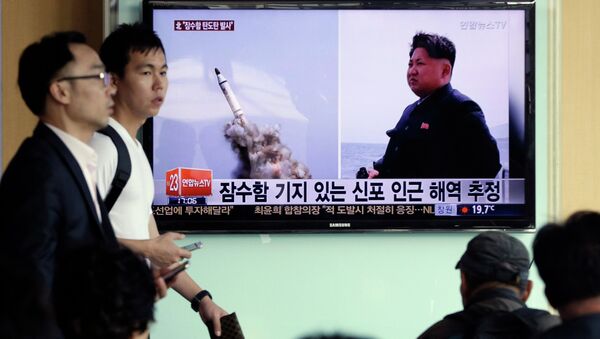The United States, Japan, and South Korea will be conducting their first joint military training exercise next month, focusing on detecting and responding to North Korea missile launches, a Seoul defense official said Monday.
The joint drills begin on June 28, and will coincide with biennial multinational naval exercises held in Hawaii between June and August, which the three countries normally attend.
Tokyo and Seoul have long suffered tensions over territorial disagreement. The Liancourt Rocks islands, also known as Dokdo or Tokto in South Korea and as Takeshima in Japan, have been administered by South Korea since 1954, but Japan disputes Seoul’s sovereignty over the territory. Fears over Pyongyang's nuclear activities look to force the sides to put those tensions on hold.
In addition to bellicose rhetoric, the North Korean administration recently engaged in a wave of ballistic missile launches, nuclear tests, and now claim to possess the advanced miniaturization necessary to launch a nuclear-armed intercontinental ballistic missile toward the United States.
The recent military escalation by Kim Jong Un’s government has resulted in increased economic sanctions against the isolated regime, as well as repeated condemnation from China, their historical ally. Beijing has moved to guard its border with North Korea with increased troop deployments, in a sign of deteriorating relations. Pyongyang has claimed self-defense, following a series of joint-military exercises in which US and South Korean forces rehearsed a full invasion of North Korea using repeated fly-overs by US nuclear-capable B-52 bombers.
North Korea’s leadership may believe that they face a pending existential threat from the US, South Korea, or Japan, or, as some have put forward, due to domestic unrest, after another round of economic sanctions has left people starving.
Historically, the North Koreans have pushed the boundaries of regional security through their use of nuclear and ballistic missile development.
The South Korean Defense Ministry says that "To hold such drills has been decided to better defend South Korea from ever-increasing nuclear and missile threats from North Korea and detailed plans have been worked out." It remains possible that the new round of heightened military drills, now partnered with Japan, could serve to exacerbate the delicate situation.
For reasons unintended, the trilateral military exercise may actually provide the world a temporary reprieve from a regional nuclear conflict. China opposes the joint expansion of military influence by Japan and the United States in the region, viewing it as a pretext to encirclement. The joint military exercise may lead the Chinese to adopt a more forgiving approach to North Korea, allaying Pyongyang’s fears of internal unrest currently being used to fuel their aggressive military posturing.





